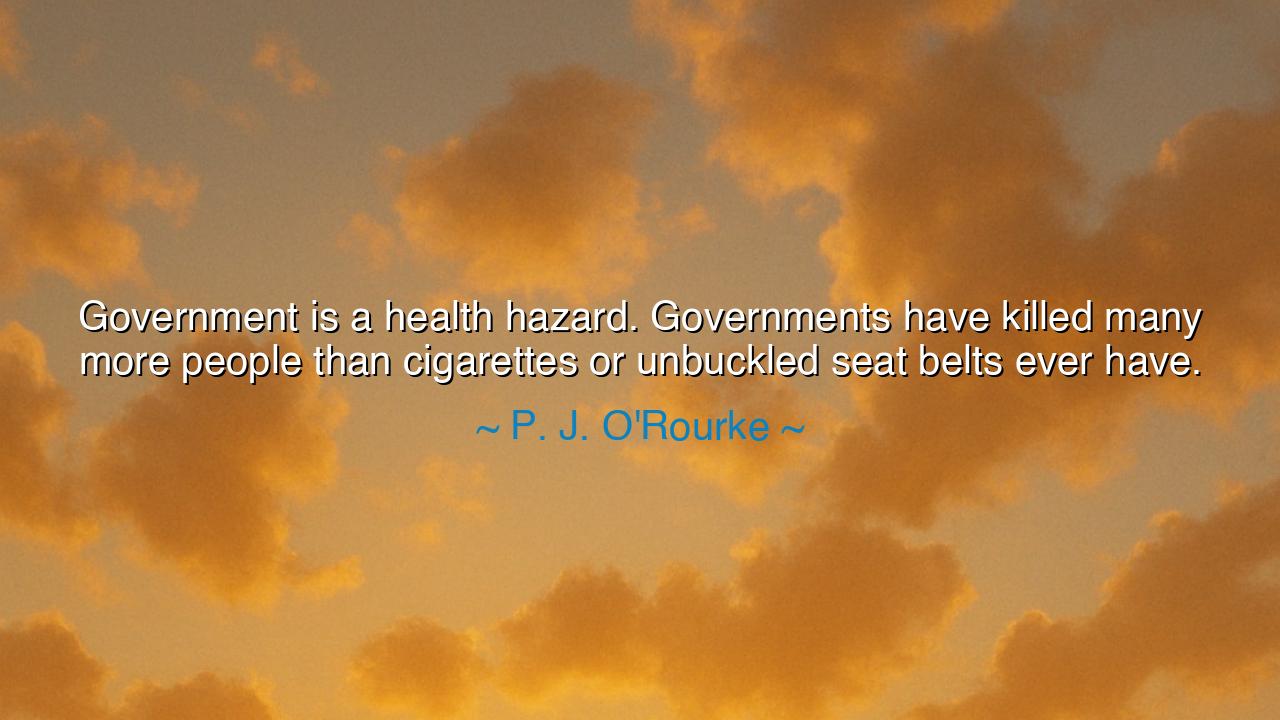
Government is a health hazard. Governments have killed many more
Government is a health hazard. Governments have killed many more people than cigarettes or unbuckled seat belts ever have.






"Government is a health hazard. Governments have killed many more people than cigarettes or unbuckled seat belts ever have." – P. J. O’Rourke
In these biting, ironic words, P. J. O’Rourke, the American satirist and political humorist, delivers a truth cloaked in humor—a truth as old as civilization itself: that power is the most dangerous addiction known to man. With characteristic wit, he compares government not to a guardian of public safety, but to a health hazard, a threat more lethal than the very vices it claims to regulate. Behind his jest lies a grim reckoning with history—an understanding that while individuals may harm through folly or weakness, governments, when unchecked, destroy through design. His humor disarms, but his insight cuts deep: the greatest dangers to mankind have not come from chaos, but from organized control.
The origin of this quote lies in O’Rourke’s libertarian philosophy, honed through decades of observing politics’ absurdities. Having written for Rolling Stone and The Atlantic, he used laughter to reveal truths that solemn speech could not. O’Rourke came of age in the shadow of the 20th century’s horrors—an era when governments, claiming to act for “the people,” committed mass atrocities on scales beyond comprehension. His jest about “cigarettes and seat belts” mocks the hypocrisy of bureaucracies that fixate on small dangers while excusing or inflicting vast ones. It is a modern echo of an ancient warning: that the state, when unrestrained by virtue, becomes the most efficient instrument of death ever invented.
To grasp his meaning, one must look upon the bloodstained pages of history. The 20th century alone bears witness to governments that turned against their own people—Stalin’s Soviet Union, where famine and fear consumed millions; Mao’s China, where ideology justified slaughter; Hitler’s Germany, where law itself became a weapon of extermination. These were not acts of chaos, but of order—executed by ministries, signed into decrees, stamped with official seals. O’Rourke’s grim humor captures this paradox: that the same force which promises to protect life, when corrupted by ambition, can extinguish it more efficiently than any natural vice. In that sense, government truly is a health hazard—because it operates with authority and impunity.
Yet O’Rourke’s words are not a call to anarchy, but a plea for vigilance. His humor masks an ancient wisdom: that power must always be restrained, divided, and distrusted. Just as the ancients built temples to remind themselves of mortality, so must citizens build institutions that remind rulers of their limits. The Founding Fathers of America understood this truth well. They created a Constitution not to empower government, but to bind it—to ensure that no ruler, however noble his cause, could wield unchecked dominion over free men. Their system of checks and balances was not cynicism—it was realism, born from the understanding that even good intentions, in the hands of power, can become tyranny.
There is a modern echo of this warning in every age where safety becomes the justification for control. Governments ban, regulate, and surveil, always in the name of protecting citizens—from disease, from crime, from one another. But as O’Rourke suggests, the state’s hand often extends further than wisdom allows. The road to servitude is paved not with malice, but with paternal concern. A people too eager to be protected will soon find themselves ruled. History shows again and again that when liberty is traded for safety, both are lost—and the government that promises to safeguard life ends up endangering it most of all.
In a deeper sense, O’Rourke’s jest touches the heart of human folly. Just as individuals deny the harm of their own addictions, so too do nations deny the danger of power. Every government begins as a servant of the people; nearly all, in time, seek to become their master. The corruption is subtle, beginning with noble causes and ending in coercion. Thus, the health hazard is not the structure of government itself, but the arrogance of its custodians—the belief that they can perfect what is inherently imperfect, regulate what is spontaneous, and control what was meant to be free.
The lesson, then, is not despair but discernment. The existence of government is inevitable, but its power must always be held in suspicion. A wise citizen does not hate government; he watches it. He demands transparency, resists dependency, and cherishes the freedom to dissent. The health of a nation is measured not by how much the government promises to do, but by how little it dares to overreach.
And so, the practical actions are these: defend your liberty as you would your life, for they are one and the same. Question every policy that claims to protect you at the cost of your freedom. Demand accountability from those who rule, and remember that government—like medicine—is only good in measured doses. For as P. J. O’Rourke reminds us with both laughter and truth, power is the most intoxicating poison of all, and it must be sipped carefully—or it will consume the very people it was meant to serve.






AAdministratorAdministrator
Welcome, honored guests. Please leave a comment, we will respond soon